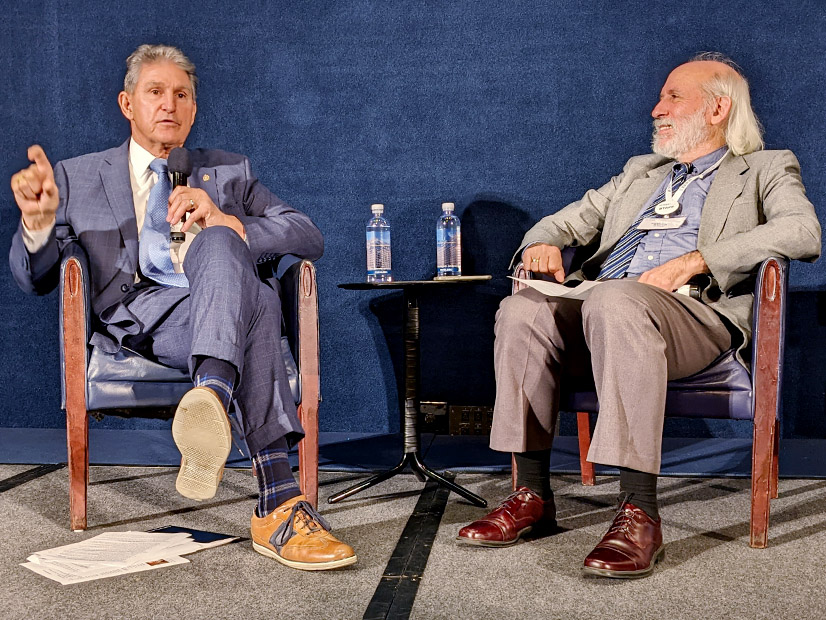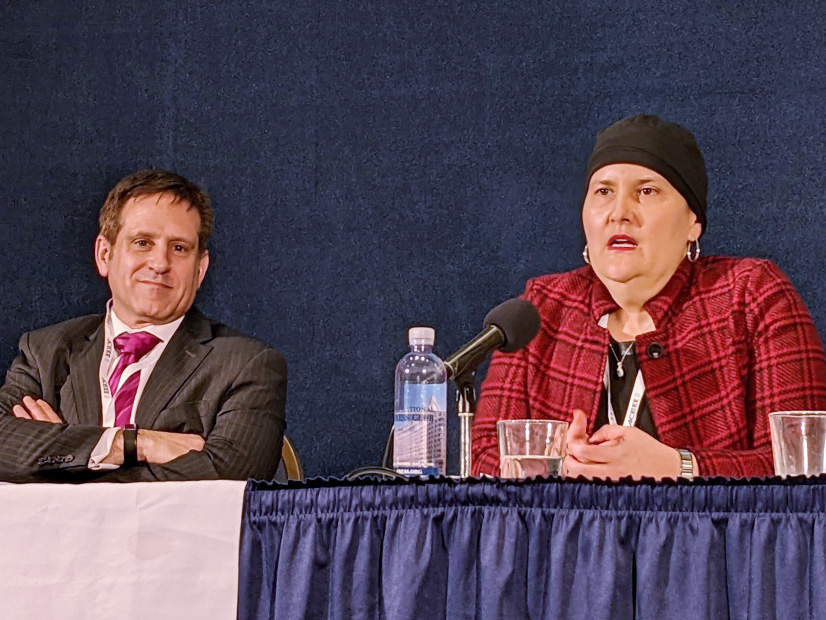
WASHINGTON — Implementation of the Inflation Reduction Act, and its $369 billion in clean energy funding, will be a major focus for Democrats and Republicans in the upcoming Congress, and both parties were present and rehearsing their talking points at the American Council for an Energy-Efficient Economy’s Energy Efficiency Policy Forum on Thursday.
Delivering the programs to be funded with IRA dollars was the central theme for White House National Climate Adviser Ali Zaidi, who called on conference attendees “to recognize the sense of urgency that is in front of us” to curb greenhouse gas emissions and the impacts of climate change.
“This is the decisive decade, and that means delivery,” Zaidi said in his opening keynote. “That means steel in the ground; it means retrofits made, not just anticipated and planned.”
Echoing President Biden’s midterm stump speeches, Zaidi also framed clean energy as an opportunity to create jobs and cut families’ utility bills. The IRA is “about meeting the American people where they are, which is a sense of anxiety and angst about what the future brings in terms of energy costs and helping put them in control of their energy futures by [providing] access and affordability to technologies that help them bend the curve on their personal family energy budget and reroute those dollars to things they probably want to spend money on: their kids; their futures,” he said.
The convergence of energy efficiency and electrification will be a key driver for IRA implementation, the law’s “moonshot,” Zaidi said, and accountability and corporate and community engagement will be critical because “we just can’t afford to screw up.”
On the Republican side, the political narrative will focus on whether the Department of Energy, EPA and other federal agencies are up to the task of rolling out the billions of dollars in incentives and tax credits in the IRA and Infrastructure Investment and Jobs Act (IIJA). With the House of Representatives in Republican control, “the waste, fraud and abuse angle, I think, it’s going to be really important,” said Mary Martin, chief counsel for the House Energy and Commerce Committee and its incoming chair, Rep. Cathy McMorris Rodgers (R-Wash.).
“These are historic amounts of dollars,” Martin said during an afternoon session previewing the upcoming Congress. “So that’s why there are heightened senses of concern in terms of keeping track of the dollars [and] figuring out where they are going. These departments and agencies have never had to handle that level of money before, and some of them don’t have the experience with giving out the grants that they’re going to have to give out. …
“I mean, some of these are four times the annual budget of these departments and agencies, so it’s a huge amount of money for any entity to have to deal with and take in and spend and do so in a wise and above-board manner,” she said.
Energy security and diversity are high priorities for McMorris Rodgers and other Republicans, who will be scrutinizing implementation of the IRA, Martin said. They will have “an eye towards making sure that, to the extent possible, this stuff is tech-neutral, fuel-neutral, so we’re not sort of putting all our eggs in one basket with the dollars,” she said.
The China Card
An outspoken critic of Biden’s clean energy policies, McMorris Rogers will likely also continue to raise concerns about the U.S. solar, battery and electric vehicle industries’ dependence on Chinese supply chains. While acknowledging the IRA’s tax credits and subsidies that promote U.S. clean energy manufacturing, Martin said Republicans will be “looking for ways to potentially improve upon some of those things … again looking at China and trying to control the influence of the CCP [Chinese Communist Party] in our energy and transportation systems.”
Underlining a strong GOP focus on China, House Minority Leader Kevin McCarthy (R-Calif.), the Republican nominee to be speaker of the House, announced Thursday the formation of a new China Select Committee, calling the CCP “the greatest geopolitical threat of our lifetime.”
While not officially announced, Republicans have also signaled that they will close down the House Select Committee on the Climate Crisis, chaired by Rep. Kathy Castor (D-Fla.).
As reported in The Hill, following the midterm elections, Rep. Garret Graves (R-La.), ranking member of the committee, said, “We don’t see a scenario where the ‘Climate Crisis Committee,’ a creature of [House Speaker Nancy] Pelosi, will continue to exist.”
While such comments suggest that implementation of the IIJA and IRA will become increasingly politicized, Rick Kessler, senior adviser and staff director for Democrats on the E&C Committee, cautioned that however carefully federal programs are designed, “fraud and abuse do happen.”
“All you can do is do your best to prevent it,” Kessler said. “Hire the best people, and if it happens, go back and say, ‘How did this happen? What can we learn?’ — and try to implement that.”

Zaidi also stressed the need for Democrats to keep the narrative positive and focused on action.
“The same folks who invested in climate denial, in climate delay, are investing in fomenting a sense of cynicism, that no matter what you do, these problems are incorrigible,” he said. They say, “‘we can’t tackle this mega challenge that’s on our doorstep; we can’t take on energy security in a bold way; we can’t lift up everybody as we do.’
“They’re wrong,” he said. “And we’ve got to prove that by delivering results in this decisive decade.”
Permitting Reform
With Congress focused on passing a budget and legislation with strong bipartisan support during its lame-duck session, potential areas for cross-party collaboration on energy issues appear limited.
Permitting reform is certainly a common area of interest, but the sidetracking of Sen. Joe Manchin’s (D-W.Va.) proposal has created a high level of friction on the issue. On Wednesday, the Democratic leadership excluded Manchin’s bill from the must-pass National Defense Authorization Act, and Manchin has taken flak from both Republicans and environmental activists. (See related story, Manchin Presses Permitting Proposal Excluded from Defense Bill.)
In a “fireside chat” with ACEEE Executive Director Steven Nadel at the forum, Manchin said opposition to his proposal is largely personal, with Republicans still mad at him over his behind-closed-doors work on the IRA.
Manchin argued that the IRA does reflect bipartisan concerns on energy development, for both fossil fuels and renewables, and will reduce inflation by lowering gas prices, home energy prices and prescription drug prices. “It’s working, and it’s popular, and it’s going to work even more,” he said. “So, this is the payback coming directly to me.”
Environmental groups have opposed Manchin’s proposal because it includes a go-ahead for completion of the Mountain Valley natural gas pipeline, which the senator argues is needed and already 80% complete. The project website says Mountain Valley is 94% complete.
Manchin also maintained that the bill is clear on cost allocation, and that it would not have states paying for transmission lines that are built across their land but do not provide direct benefits or energy to them.
“Read it; just read the damned language!” he said. “The grid system has to be connected and energized, and we’ve got to able to [do it] and get this smarter. …
“You can’t even build what you need; you can’t even finish what you’ve got to have. I would tell the American public, if people are putting politics above policy because it’s good for the country but may be bad for your personal politics, then maybe you’re in the wrong profession.”
Responding to a question about Republicans’ views on permitting reform, Martin did not specifically mention transmission. Rather, she said, Republicans have developed an agenda for security and energy, which includes ideas on “dealing with natural gas pipeline permitting or nuclear licensing reform, hydropower licensing reform, critical minerals [and] issues at the DOE.”
But Kessler said that any effort to pass permitting reform will require getting both parties and all the stakeholders at the table.
“It will never succeed unless we are all in it together, working and listening to each other,” he said. “You can sit in a room by yourself and come up with the perfect package. But what happens is you roll that out, and no one has any vested interest in that, and other people have their idea of the perfect package. And that may be very different. … It involves inclusiveness.”



